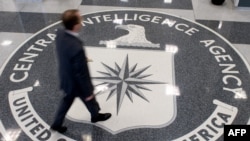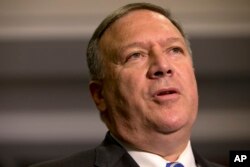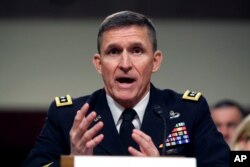President-elect Donald Trump's first selections for key national security posts may say little about his foreign policy vision, but they do seem to emphasize a commitment to take the country's intelligence agencies out of their comfort zone.
Trump on Friday announced his intention to nominate Mike Pompeo, a Republican congressman from Kansas, to lead the CIA, and his selection of retired Lieutenant General Michael Flynn as his national security adviser.
Pompeo, a member of the House Intelligence Committee, quickly received praise from veteran lawmakers and members of the U.S. intelligence community for his serious and nuanced approach.
Flynn, a former head of the Defense Intelligence Agency (DIA), has been more controversial, chastised by critics for his abrasive management style as well as for his outspoken views on fighting Islamic militants.
Both outsiders
But one thing the men have in common is that while they are familiar to U.S. intelligence agencies, they are, in a sense, outsiders.
Unlike current CIA Director John Brennan, who began his career with the agency, Pompeo's only intelligence experience comes from his service on the House Intelligence Committee.
Flynn, though a known quantity in intelligence circles, was reportedly pushed out as director of the DIA, in part because of clashes with other U.S. intelligence officials.
Such appointments would seem to support early talk from those close to the Trump transition team about changing the approach at the U.S. intelligence agencies while at the same time reinvigorating them after years of stagnation.
"You're going to see innovation return," said Tony Shaffer, a retired intelligence officer who worked with Flynn.
"A lot of what I've seen in the Obama White House is akin to doing the same thing over and over again and hoping for a different result," said Shaffer, now vice president of Strategic Initiatives and Operations at the London Center for Policy Research. "There's a lot of passion. People are excited about trying to roll in and do some good things."
Comfort zones
Juan Zarate, who served as a deputy national security adviser for combating terrorism under President George W. Bush, called Pompeo and Flynn "serious national security professionals," but cautioned each would most likely face challenges in his new role.
"Probably a good idea for any transition into any department or agency is to be conscious that every department and agency has its own culture, its own rhythm, its own history," Zarate said, adding that this will be especially important for Pompeo as he prepares to take the reins at CIA, pending eventual confirmation in the U.S. Senate,
"He's obviously going to have to be attentive to that and do some look-backs to make sure he doesn't misstep the way others have," he said.
Former CIA Director Michael Hayden offered a similar sentiment.
"Not that the congressman's asked me for any advice, but when you go to Langley [CIA headquarters] for the first time, get out of the car alone," Hayden said Friday during a discussion at the Foundation for the Defense of Democracies in Washington. "Don't bring your own ecosystem. Go into the agency and embrace the agency."
Hayden said Flynn, whom he described as hardworking and bright, would also be forced to make some key adjustments.
"Most of his life experience has been at the tactical level, where he has been incredibly successful, so I think this job is going to extend him," he said. "It's going to demand he up his game to be more broadly strategic."
Unlike Pompeo's position, Flynn's appointment does not require Senate confirmation.
No foreign policy preview
It's not clear what, if anything, the appointments indicate about Trump's foreign policy priorities.
"It doesn't, and it shouldn't," said James Woolsey, a former CIA chief who has endorsed Trump and serves as one of his advisers.
Neither appointee, according to Woolsey, will be in a position to create policy.
"If you get involved in advising on policy, your colleagues in State, Defense, and elsewhere will think you are spinning intelligence in order to support the policies you favor," he said.
Still, it appears that both Flynn and Pompeo may challenge what have become institutional norms when it comes to their approach on the war against Islamic extremists.
Obama critic
Since retiring from the military, Flynn, 57, has been a harsh critic of President Barack Obama's strategy in fighting the Islamic State terrorist group, and his criticism has often crossed the line into denigrating Islam and Muslims.
The former three-star general has referred to Islam as a cancer. He has called it a "political ideology," rather than a religion. In a tweet from February, he said: "Fear of Muslims is RATIONAL."
As CIA chief, Pompeo, 52, also appears set to challenge the status quo. He supports the CIA's now-suspended "enhanced interrogation program," which included waterboarding and other methods many say amounted to torture.
Those involved in the CIA interrogation program "are not torturers, they are patriots," Pompeo said in 2014, adding that the programs were "within the law, within the Constitution and conducted with the full knowledge" of appropriate lawmakers.
Pompeo, a graduate of Harvard Law School and the U.S. Military Academy, also drew criticism in 2013 after he suggested Muslim leaders who didn't publicly condemn terror attacks were "potentially complicit" in the attacks.
Trump's transition team on Friday defended both men as capable and experienced.
"Flynn is widely regarded as one of the most respected generals and intelligence officers of his generation," said Jason Miller, Trump's transition communications director. "I don't think there are many people who have a deeper understanding of the capabilities of the U.S. military and intelligence apparatus."
Miller declined to comment on Pompeo's views on torture, saying he had not yet discussed the issue with him.







